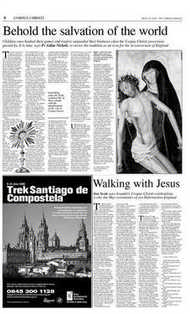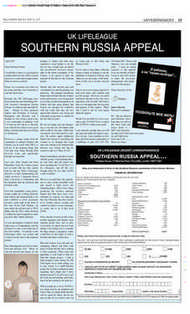Page 3, 20th May 2005
Page 3

Report an error
Noticed an error on this page?If you've noticed an error in this article please click here to report it.
Tags
Share
Related articles
Pope Chooses New Right-hand Man To Reform Roman Curia
A Turbulent Decade For The Church
Interpreting Curial Jargon
News Review
Europe
New curial official attacks ‘stupid’ Tablet
A NEWLY appointed British official to the most powerful congregation in the Vatican has launched a devastating assault on the Tablet, the liberal Catholic magazine.
Fr Patrick Burke described the publication as “outrageously stupid and silly”.
Fr Burke was hand-picked by the then Cardinal Joseph Ratzinger, now Pope Benedict XVI, in November 2003 to join the Congregation for the Doctrine of the Faith (CDF) as a doctrinal official.
As editor of Faith, a conservative Catholic bi-monthly journal, Fr Burke issued a furious attack on Catherine Pepinster, the editor of the Tablet, for her publication’s commemorative issue on John Paul II — which contained a number of criticisms of the late Pope and listed suggestions for changes in the Church.
In its editorial the magazine described John Paul’s “negative response to liberation theology, above all his failure to help Archbishop Oscar Romero before he was assassinated” as “one of the calamities of his papacy”.
Some Catholics felt that, in effect, the Tablet was implying that Pope John Paul shared some responsibility for the archbishop’s murder. They were further angered by its opposition to moves to speed up John Paul’s canonisation process.
“I did not want to fight the Tablet, but I feel there comes a stage when something is so outrageous that there has to be a response,” Fr Burke told The Catholic Herald this week.
He said that if the Tablet was not prepared to stand up for the Catholic Church then it should not publicise its support from the Bishops’ Conference of England and Wales.
“You can’t have your cake and eat it,” he explained. “If you want the endorsement of the hierarchy, then it seems to me that you should be completely loyal.
“The Tablet wants the hierarchy to say: ‘Yes you are all wonderful little Catholics’, but on the other hand it wants total freedom to whack everybody in sight and follow its own agenda, regardless of the agenda of the Church.” Some Catholic liberals may interpret Fr Burke’s remarks as evidence of Rome’s desire to “purge” dissidents. It emerged earlier this month that Fr Thomas Reese has been removed as editor of the Jesuit magazine America on the advice of the CDF.
However, as we report on our foreign pages this week, the new prefect of the CDF, Archbishop William Levada, is regarded as a moderate figure with no close associations with the Church’s conservative wing.
In his editorial Fr Burke accused “Catherine Pepinster and co.” of “hypocrisy” and berated them for their sniping against John Paul II’s pontificate.
“One almost has a sense that they interpret a papal election to be the same as a party political election: a new Pope will reverse and change the previous Pope’s “policies” (ie, the teachings of the Church) in much the same way that a new Prime Minister does with his predecessor’s policies. ” he wrote.
In response Ms Pepinster argued that the Faith editorial was misguided. “Fr Burke is, of course, entitled to his view, but it seems a shame that he bases it on very selective quotations from the Tablet,” she said.
“He also omits to mention other contributors to the Tablet’s papal obituary edition, including George Weigel [a respected American theologian who has defended Catholic orthodoxy], whose views I imagine he would prefer to others he mentioned in his commentary.
“Others do not share Fr Burke’s opinion of the Tablet. Many readers, including those who read the Tablet for the first time when they bought the papal obituary edition, commented on its balance and how measured they found the leader on John Paul II. Indeed, so popular was the edition that it enjoyed record sales.” Fr Burke declined to say whether, in his new role, he would bring his opinions to the attention of the CDF, commenting that he did not know what his post would entail. “I really don’t know what they want me to do,” he said.
Fr Burke, who for six years has edited Faith, is a popular priest and distinguished academic.
He has gained a reputation for publicly savaging liberal figures. “If Cardinal Ratzinger was ‘God’s Rottweiler’ then Fr Burke will be his bloodhound,” said one Vatican source. “He is not a reticent man. What he lacks in charm he makes up for in clarity of thought.” On BBC2’s Newsnight the evening that Pope Benedict was elected, Fr Burke became caught up in a bitter argument about orthodoxy with Cristina Odone, the Catholic journalist and broadcaster.
Fr Burke told parishioners last weekend that he was leaving for Rome in September. He will also step down as editor of Faith. As an official for the CDF, he is expected to become one of the most influential British men in the Catholic Church. There are only 36 full-time officials in the Congregation.
Yet for personal reasons Fr Burke would have preferred to stay in Scotland. He said: “I don’t want to go to Rome. It’s very difficult for me. I am very happy here. But it’s an obedience thing, it is a legitimate request from a legitimate authority.” Fr Burke was born in Rhodesia, but went to school in England and has for a long time worked in Stirling, Scotland. He runs two parishes, and is chaplain to the University of Stirling. He also has close ties with the Catholic Society of St Andrews’ University.
Pope Benedict knows Fr Burke personally. The two men often met while Fr Burke was studying at the German College in Rome, where Cardinal Ratzinger was often a guest.
They share an interest in the liberal German theologian Fr Karl Rahner. Fr Burke’s doctorate, “Re-interpreting Rahner”, a critical overview of the theologian’s influential work, was well received in the Vatican.
“We can assume that Ratzinger has an eye for talent and his memory hasn’t failed him in picking out this unusually gifted young theologian,” said a priest close to the Vatican, who did not wish to be named.
The Tablet has already had brushes with the CDF, and Cardinal Ratzinger, its former prefect, in particular.
John Wilkins, the former editor, said he received two “yellow cards” from the man who would eventually succeed Pope John Paul II.
In October 1991 Cardinal Ratzinger wrote a long letter to the journal criticising two articles on remarriage after divorce. “He thought [the pieces] diluted the edge of the Catholic witness to the Gospel,” said Mr Wilkins.
“I published the letter, of course, in full. My critics said that that week the Tablet was really worth reading.” In March 1999, Cardinal Ratzinger wrote another letter to Mr Wilkins, objecting to an article from Cardinal Franz König, in which the late Archbishop of Vienna had argued in support of liberal views on religious pluralism.
blog comments powered by Disqus

















